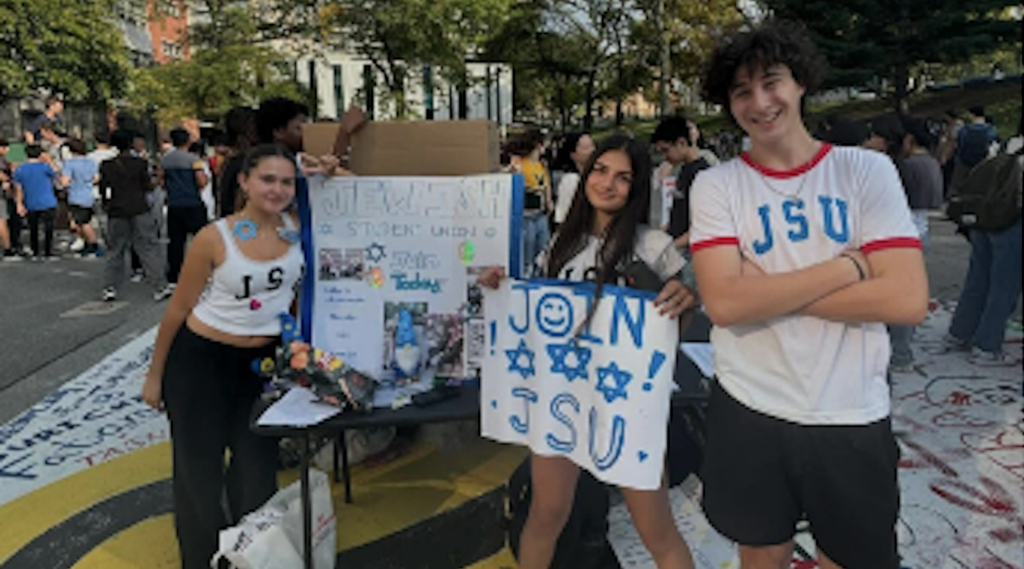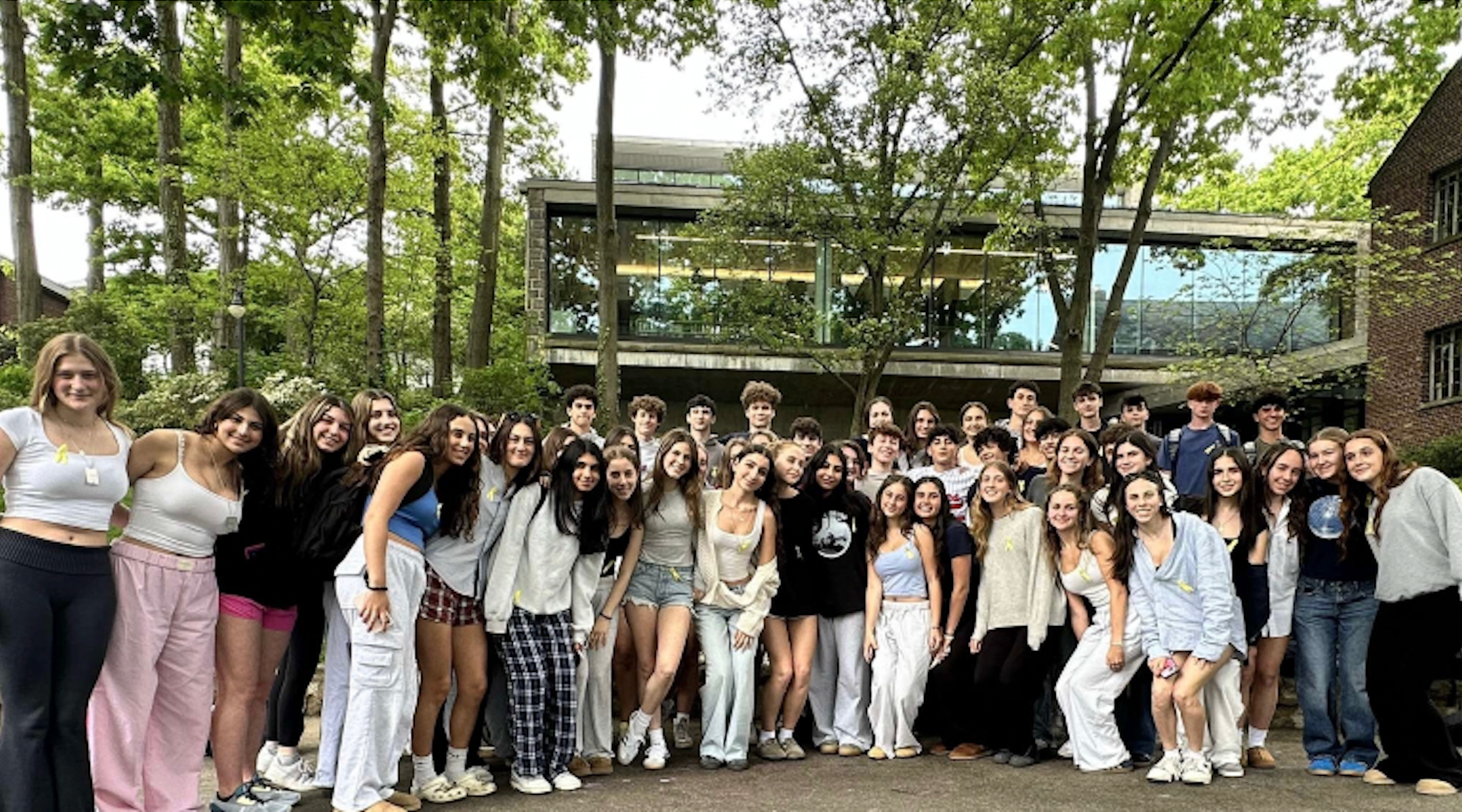This article was produced as part of The New York Jewish Week’s Teen Journalism Fellowship, a program that works with Jewish teens around the world to report on issues that affect their lives.
When Talia Sobel was a freshman member of the Jewish Student Union at Trevor Day School on the Upper East Side, the club spent a lot of time discussing the joys of Judaism, such as holidays, culture and traditions.
Now, as a junior, she is the leader of the club, which meets each Tuesday at the private school. And instead of devoting meetings to holidays or crafts, she’s pivoted the JSU’s focus toward making space for teens to talk about the challenges of being Jewish in a post-Oct. 7 world.
“This school year and in future years, we need to talk more about the events from this past year, as they are now a part of history,” Sobel said, adding that conversations about current events in Israel and Gaza are essential to prevent the rampant spread of misinformation associated with the war.
Sobel’s club isn’t the only one to make this pivot. As the number of antisemitic attacks grew in the U.S. following Hamas’ Oct. 7, 2023 attack on Israel, leaders of Jewish student groups in high schools around New York City are changing the agendas of Jewish Student Unions and other Jewish affinity groups. Many of these clubs are no longer focused on lighthearted activities, such as making mini sukkahs or braiding challah. Instead, they are creating safe havens for Jewish students, many of whom feel unable to discuss their Jewish identity elsewhere.
At Trevor Day School, the JSU this year is focused on education. In order to foster productive conversations among the club’s members, meetings now have community norms for discussions: No interrupting. Disrespect of opinions will not be tolerated. Stay calm in heated conversation. Use “I” statements rather than generalized statements. Sobel said that, by practicing these tools within the relatively safe environment of the JSU, students will be better able to handle challenging conversations outside of it.
Like Sobel at Trevor, Mika Rosenthal, a junior at the Ethical Culture Fieldston School, said that before Oct. 7, the mission at her school’s Jewish Affinity Group was to celebrate Jewish culture and holidays. Now, however, the group the “strives to create a more welcoming and inclusive environment for Jews and non-Jews who want to learn more about Judaism,” Rosenthal, the group’s leader, said. She added that she wants all Fieldston students to have a place to understand Jews and the Jewish experience because she felt a lot of friction at the school last year.
This school year, Rosenthal said she’s focused on creating a safe haven for her Jewish classmates within the group. “Our goal is to create a space where members can connect, engage, and feel proud of our Jewish heritage,” she said.
Last fall, JAG members at Fieldston had a conversation with school administrators about how they want the Israel-Hamas conflict to be discussed at school. “We experienced significant tension last year surrounding Oct. 7, and the JAG was primarily focused on having difficult conversations among Jewish students,” Rosenthal said, adding that the discussions often get emotional as her peers process their experiences of being a Jewish teen as the war continues.

At the Bronx High School of Science, students in the Jewish Student Union is holding firm as a space of celebration. (Courtesy)
Rosenthal added that, immediately after Oct. 7 and into this school year, her group has emphasized smaller, more intimate conversations to limit any hostility within the group. “We want to shift toward bringing our community [together] in more positive ways, which is aligned with one of the key initiatives of our school,” Rosenthal said.
At the iSchool, a public high school in SoHo, Zach Leitner didn’t have a JSU where he could process his feelings after an antisemitic incident during his freshman year, so this year, as a sophomore, he decided to start one. He wanted to create a place to talk about upcoming holidays, play games and learn about Jewish history. The weekly club has made candy sukkahs in preparation for Sukkot and learned about the different branches of Judaism through a slide show Leitner prepared.
“Going to a NYC public school makes it harder to think about controversial things, just like the conflict in the Middle East,” Leitner said, adding that the culture of diverse opinions can be overwhelming in a large diverse school.
“This is why we have our club, so that Jewish student voices can be heard,” Leitner said. Leitner and the other leaders of the club have discussed the idea of having conversations about the war but have so far decided against it. “The nature of the club is for Jewish kids to hang out and have fun,” he said.
Still, Leitner said there are plans to discuss the war and take advantage of his school’s diverse student body. As such, the iSchool JSU plans to have a joint event with the Muslim Student Alliance to discuss various perspectives on the war.
Since the Israel-Hamas war began in 2023, Jewish teens have reported strained relationships with friends amid rising fears of antisemitism, according to Hey Alma. One-quarter of Jews have sought new connections with other Jews, and 43% of Jews have sought to or engaged in Jewish life since Oct. 7, according to the United Jewish Appeal Foundation. For young Jews, school-affiliated clubs provide a sense of support, according to the National Council of Synagogue Youth, an organization affiliated with the Orthodox Union that runs a program that supports Jewish school clubs at more than 320 high schools across North America.
While some JSUs are shifting their focus as the war between Israel and Hamas continues, the one at Bronx Science, a specialized high school in the Bronx, is holding firm as a space of celebration. This is something leaders say is especially important because, since Oct. 7, the group now regularly has up to 50 students attending its weekly meeting.
“We don’t want our meetings to feel like a debate every time,” Noa Senker, the secretary of the Bronx Science JSU and an 11th grader, said. “We want to continue highlighting the culture and holidays so that Jewish students with all different opinions can feel included.”
For Sukkot they built Sukkahs from pasta and for Yom Kippur they played “put a finger down” to discuss things students need to atone for. Senker said that these fun activities are more important than ever, “because it is most important for everyone to feel rooted in the culture, especially at this time.”
The New York Jewish Week brings you the stories behind the headlines, keeping you connected to Jewish life in New York. Help sustain the reporting you trust by donating today.





